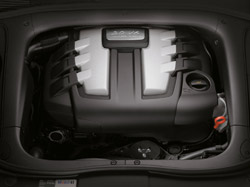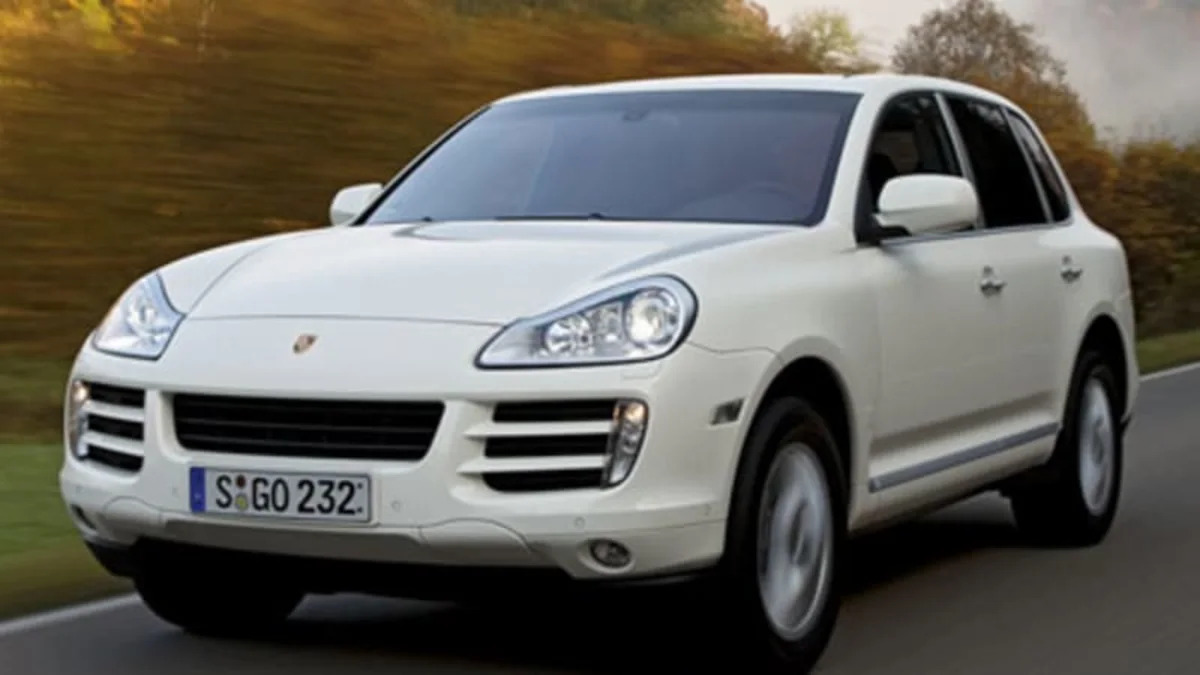Click above for high-res gallery of the Porsche Cayenne Diesel
 Despite Porsche's longtime reluctance to go diesel, environmental and economical pressures have finally made it impossible for Porsche to ignore the added efficiency that Rudolph's old compression ignition engine design allows. Porsche still seems hesitant to proudly display its diesel engine as unique badges are conspicuously absent in the just-confirmed Cayenne Diesel. In any case, the 240 horsepower and wide torque plateau of 405 lb-ft seems fitting for the Cayenne, which already breaks Porsche's tradition of sportscars in a big way. The six cylinder powerplant itself comes from Audi, displaces 3.0-liters, emits 244 g/km of CO2 and manages about 25 miles per gallon (9.3L/km in Europe) of diesel fuel.
Despite Porsche's longtime reluctance to go diesel, environmental and economical pressures have finally made it impossible for Porsche to ignore the added efficiency that Rudolph's old compression ignition engine design allows. Porsche still seems hesitant to proudly display its diesel engine as unique badges are conspicuously absent in the just-confirmed Cayenne Diesel. In any case, the 240 horsepower and wide torque plateau of 405 lb-ft seems fitting for the Cayenne, which already breaks Porsche's tradition of sportscars in a big way. The six cylinder powerplant itself comes from Audi, displaces 3.0-liters, emits 244 g/km of CO2 and manages about 25 miles per gallon (9.3L/km in Europe) of diesel fuel.
The new Cayenne diesel is scheduled to hit European dealerships in February of '09 and we'd be surprised if Porsche kept the TDI engine out of the States, especially if Mercedes continues to have successes with its BLUETEC line of 'utes and Audi with its Q7 TDI. If that happens and the Cayenne TDI makes it to the U.S., the clean diesel engine would likely also join the BLUETECs in getting Federal tax breaks, which is nice.
[Source: Porsche]
PRESS RELEASE
Premiere at Porsche: Cayenne with diesel engine
Stuttgart. The Executive Board at Dr. Ing. h.c. F. Porsche AG, Stuttgart, has given the go-ahead: from February 2009, the sports car manufacturer will offer a Cayenne with a diesel engine and thus extend its range of drives for the sporty all-terrain vehicle further, once again. This decision was taken in response to changed legal regulations especially in European markets, resulting in tax incentives for vehicles with diesel engines. Furthermore, Porsche's stake in the Volkswagen Group, the world's largest manufacturer of modern diesel engines for passenger cars, has opened up new opportunities to utilise diesel technology.
Porsche will equip the Cayenne with a three-litre V6 turbo diesel engine with 240 hp (176 kW) supplied by Audi AG, a subsidiary of the VW Group. The average consumption of the Cayenne Diesel is 9.3 litres per 100 kilometres, with CO2 at 244 grams per kilometre. The spontaneous throttle response and the high torque characteristics of this diesel engine deliver the required performance levels for a sporty all-terrain vehicle such as the Cayenne. The substantial torque of a maximum of 550 Newton metres complements the sporty chassis dynamics and provides a high degree of control to offer driving enjoyment that is typical of Porsche.
In response to customer demand, the new Cayenne model will initially be offered in Europe. Preparations for market introduction in other countries are underway.
The Porsche Executive Board is confident that it will maintain the long term market success of the Cayenne series in the long term with the low-consumption V6 turbo diesel. In the last financial year 2007/08, 45,478 units of this series (which currently incorporates five different models) were sold - more than ever before in a financial year.
With the introduction of the Cayenne Diesel, Porsche is consistently continuing its commitment to reduce fuel consumption. As early as Spring 2007, the sports car manufacturer had equipped the new generation of the Cayenne series with engines with petrol direct injection that consume up to 15 percent less fuel in real-world driving conditions. Since the summer of 2008, Porsche has also offered the most recent generation of the 911 series with direct-injection petrol engines. The sports car manufacturer is also working on another Cayenne variant with hybrid drive that will consume less than nine litres of fuel per 100 kilometres and will be launched onto the market at the end of the decade.
The new Cayenne with diesel drive will be available from dealers from February 2009 onwards. Equipped with the proven Tiptronic-S automatic gearbox as standard, the Euro base price will be EUR 47,250. In Germany, the Cayenne with diesel engine including 19 percent VAT and country-specific equipment costs EUR 56,436.


Sign in to post
Please sign in to leave a comment.
Continue